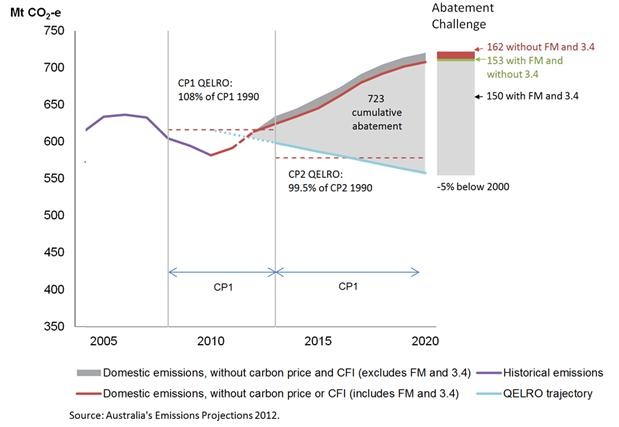Abbott's Direct free kick
The federal government has provided Climate Spectator with emissions data that indicate obscure changes in emission accounting procedures have made it noticeably easier for Australia to meet its emission targets. These have reduced the amount of abatement required to meet our Kyoto II international agreement obligations by more than 10 per cent.
Back in mid-May Climate Spectator ran a story, Greg Hunt’s free kick, which explained that Australia had adopted a number of changes to emission accounting rules. These involved counting changes in natural carbon stores from forest harvesting, and soil carbon in cropland and grazing land, as well as revegetation.
These will of course mean that Australia’s emissions accounting is more comprehensive. Provided these sources of emissions can be measured reliably it would represent an improvement over existing procedures.
But they also mean the government has essentially given itself, and most likely a future Abbott government, a significant free kick by virtue of an accounting change, rather than anything changing on the ground.
The chart below, provided by the department formerly known as ‘climate change’ illustrates Australia’s projected emissions after the accounting change in the solid red line (this is assuming no carbon price in place). The dark grey above the red line indicates where emissions would have been, were it not for the accounting change.
Australia’s projected emissions without carbon pricing and abatement task relative to emission targets

Source: Department of Industry, Innovation, Climate Change, Science, Research and Tertiary Education
If we just take the single year of 2020, the advantage flowing from the changes appears minor. Forestry management plus the land use changes (known as article 3.4 from the Kyoto agreement) only reduce the abatement task from 162 to 150 million tonnes to meet a 5% reduction from 2000 level emissions by 2020.
But Australia’s Kyoto II obligation is not the single year of 2020, but rather a cumulative one across the entire period of 2013 to 2020 (the red dotted line titled, ‘CP2 QELRO’).
So that 12Mt accumulates each year over this period to provide a 96Mt bite out of our cumulative abatement task, leaving 723 Mt of abatement required.
Australia has however, accumulated another 96Mt of surplus emissions credits from undershooting our Kyoto I target between 2008 and 2012. These can be counted towards our Kyoto II obligations, so all up the cumulative abatement task is 627Mt.
Now all of this is based on emissions projections prepared last year which now look like a significant overestimate. So in fact the accounting changes could represent far more than a 10 per cent leg-up over a no carbon pricing business as usual scenario.
The Climate Change Authority will consider all these issues in its current review and may therefore recommend a more stringent target than the Kyoto II QELRO target illustrated above. The government of the day is, however, free to ignore the Authority and indeed Abbott intends to abolish the body altogether.
It's worth noting that powerful industry lobby groups such as the Business Council of Australia and the Australian Industry Greenhouse Network are arguing that the government shouldn't set targets assuming a global goal of limiting warming to 2 degrees. They also argue that there is no basis for the government to tighten the target beyond the Kyoto II QELRO target above. So even though the 5% bare minimum emissions cut is looking far cheaper to achieve than anyone ever thought just two years ago (see Vivid Economics analysis), anything more stringent will be furiously resisted.













